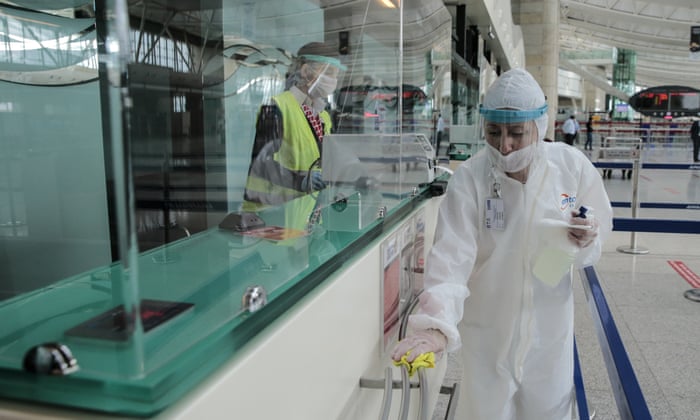Analytical Perspective
"The data presented in this study demonstrates that infectious SARS-CoV-2 can be recovered from non-porous surfaces for at least 28 days at ambient temperature and humidity (20 °C and 50% RH). Increasing the temperature while maintaining humidity drastically reduced the survivability of the virus to as little as 24 h at 40 °C. The persistence of SARS-CoV-2 demonstrated in this study is pertinent to the public health and transport sectors. This data should be considered in strategies designed to mitigate the risk of fomite transmission during the current pandemic response."The effect of temperature on persistence of SARS-CoV-2 on common surfaces ... BMC Virology Journal
 |
| Sars-CoV-2 can survive for up to 28 days on surfaces such as the glass on mobile phones, stainless steel, vinyl and paper banknotes, Australian scientists have found. Photograph: Anadolu Agency/Getty Images |
"This research shows that we need to continue to wash our hands and sanitize door handles, cutlery, cash machines and other commonly used surfaces."Trevor Drew, director, Australian Centre for Disease Preparedness"At 20C, which is about room temperature, we found that the virus was extremely robust, surviving for 28 days on smooth surfaces such as glass found on mobile phone screens and plastic banknotes.""For context, similar experiments for influenza A have found that it survived on surfaces for 17 days, which highlights just how resilient SARS-CoV-2 is."Debbie Eagles, deputy director of the ACDP
Fascinating what research will reveal. But as Dr.Christopher Labos, a Montreal doctor, associate with the McGill Office for Science and Society points out, tests carried out in scientific laboratories produce results that will not necessarily apply to venues outside a laboratory. Researchers spray virus-containing solutions on a surface, then repeatedly measure for virus traces until such time as there is an absence of detectable virus presence. A laboratory presents a controlled venue where viruses are known to survive for longer periods than within the real world outside a laboratory.
Left on an inert surface viruses will die, since they replicate within hosts. How long it takes for them to expire will depend on environmental conditions where factors such as heat and UV light are controlled in favour of their longevity in a laboratory for experimental purposes, as compared to 'outside' where both factors lead to the viruses' expiration. Researchers control for factors that generally increase viral degradation for study purposes. In this study, samples on a number of surfaces were maintained in incubators ensuring a stable temperature. As well, the experiments were carried out in light-absence conditions.
Whereas in real-world environments viruses would likely not survive for very long outside a host body where the conditions for replication are present. In the opinion of most experts in the field, COVID -19 transmission through surfaces contaminated by the virus is not likely to be a major source of infection. The results of this new study out of Australia is not likely to change that informed opinion. All the more reason to respect the fundamentals of self-and-other protection by distancing, washing hands scrupulously and mask-wearing.
Respiratory viruses tend to spread from person-to-person through respiratory droplets expelled from nose and mouth when we talk, laugh, breathe, cough, sing, or otherwise expel virus-containing, moist breath. There is a debate among experts revolving around the distance the respiratory droplets and aerosols are able to travel and for how long they may linger in the air before dropping to the ground, however, the general consensus is that most new infections of COVID occur as a direct influence of one person to another.
Fomites are inanimate objects, surfaces that have the potential to present as infection sources. If someone has contracted COVID, and touches a surface, they will leave traces of the virus, particularly if they have sneezed or coughed into their hands. The next person to be exposed by touching that contaminated surface stands a good chance of contracting COVID-19 if they convey the infection on their hands to their mouths or eyes. Which is where conscientious surface-wiping with antibacterials and handwashing comes in as a safeguard. Or the use of antiviral wipes.
The New England Journal of Medicine published a letter when the first wave of infections in the global pandemic arrived, suggesting that the SARS-CoV-2 virus that causes COVID-19 could survive on such surfaces as plastics for up to three days, although on other surfaces like copper and cardboard the survival time was much shorter. However, three days became the standard cut-off for concerns over the length of time the virus might survive outside a receptively warm and replication-nurturing body.
"That's why regularly using disinfectant wipes and hand sanitizer makes a difference.""And it's exactly the same for eftpos (card machine that will accept debit and credit card payments) machines and public transport, but there is obviously exposure to a lot more people there than just your own phone, where you are the only one that has close contact with it.""We know that on surfaces like public transport, there has been a lot more cleaning of public spaces, because with effective cleaning you can remove the virus.""It is really important that we clean and sanitize frequently touched areas like public spaces, shops, eftpos machines.""If they are cleaned well, cleaning is really effective."Debbie Eagles, deputy director, Australian Centre for Disease Preparedness
 |
| The research was done within the CSIRO's highly secure biosecurity level four laboratories at the Australian Centre for Disease Preparedness.(Supplied: CSIRO) |
Labels: COVID-19, Fomites, Research, Virus-Infected Surfaces

0 Comments:
Post a Comment
<< Home